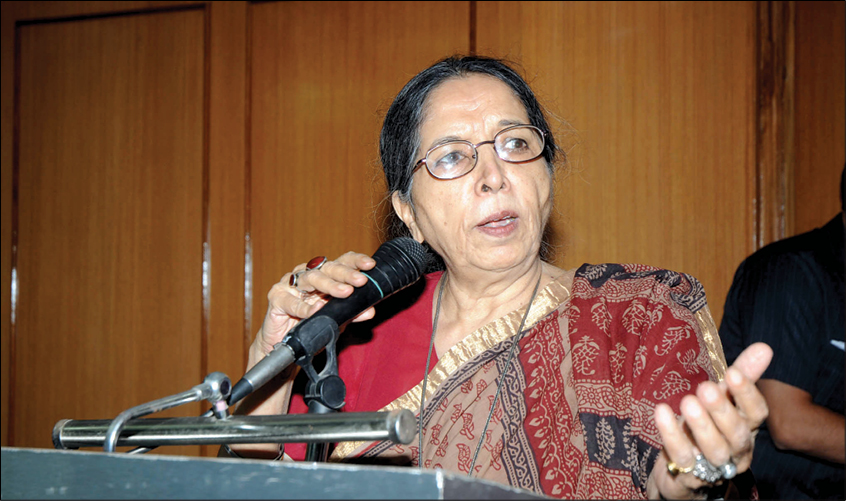In an interview with Bhumika Popli, acclaimed writer Ajeet Cour, whose autobiography has recently been translated from Punjabi into English, talks about her undying creative spirit.
Padma Shri awardee Ajeet Cour’s autobiography, which was originally published in Punjabi, has recently been translated into English. Now titled Weaving Water, the original autobiography was published in two parts, the first called Koora Kabara (1997)and second Khanabadosh (1983). The English translation is done by Masooma Ali and Meenu Minocha, and published by Speaking Tiger. In 1986, Cour won the Sahitya Akademi Award for her autobiography.
Q. What prompted you to write the autobiography?
A. There are certain happenings in life that you cannot overcome. You have to deal with them in some other way and the best way is to talk about them and to take out the poison which is collected inside you. Every mishap leaves a lot of pain and anguish in your heart. You have to somehow shed it. I don’t know why I wrote it. I said in my opening remarks in one of the two volumes that I don’t know why I have sown the seeds of these cactii because the thoughts as cactii hurt me, ultimately with their thorns but I couldn’t swallow the pain inside me. It was so painful, so I had to take them out.
Q. If we talk solely about writing, could you tell us what led you to embark on this creative pursuit?
A. I remember I was 16. I had fallen in love with my professor. And he thought I was just a kid. I wanted to prove that I was not a kid anymore and had feelings. So once in my college, where I was a bachelor of fine arts in English, I participated in an intercollegiate competition. People were reading their poems and stories. And I wanted to prove my case to the professor. So I wrote a story and read it out there. And there itself a publisher of a very well-known magazine sent me a chit backstage which read: “Can I have the manuscript?” He was the publisher of a very well-known magazine. That gave me the push and there was no looking back.
Q. Looking at our time, the atrocities committed on women are on an all-time high. Can literature help society in any way in such a predicament?
A. I think if anything can work during these times, it is literature. Literature can reach the hearts of people. People take literature seriously, and not the speeches by politicians. Nothing can be achieved by listening to the speeches by politicians. Literature is the only positive factor which touches people’s heart and increases their sensitivity. Hence, positive results can be obtained in society.
Q. You have translated works by Ralph Waldo Emerson, Henry James and others into Punjabi. Could you talk about your experience of translating from English?
A. I used to do translation only for money. I didn’t have money during that time and wanted to earn some. I used to get Rs 2-3 per page. So I would work on translations every day till midnight to make money. It was not out of love. Translation is a very tough job. Because you have to get it into the heart of the original writer and “transform” “transcreate” the whole thing into your language. According to me, it is not translation, it is transcreation.

Q. Could you give us an insight into the current scenario of Punjabi literature in the country?
A. Very poor. There are only some writers who are writing in Punjabi. We can see a definite downfall. Hindi is going places and Punjabi is not. In Punjab, some special efforts have to be made. We have given suggestions to the chief ministers of the state, who came into power one after another, to buy books and get them on to the panchayat libraries.
At present, there are more than 12,000 panchayat libraries. Now the provision is whatever those libraries buy, 50% of the amount will be reimbursed by the government. We have told them whatever you buy; we will get you 50% concession from the publisher, just buy the books and make the public read. Otherwise, how does a poor villager know what books have come out. We will suggest the books to you. This is a very positive suggestion but nobody listens because they don’t have the vision. And they don’t bother. They are afraid of literature somehow because literature asks questions. They don’t want any questions. They want readymade questions and answers which they can supply to the public.
Q. Every year you organise the SAARC Festival of Writers. Tell us about that.
A. The festival brings cultural connectivity between nations. When originally the SAARC Charter was made, they forgot to include culture in it. No form of cultural exchange was present. After our work for two years, the SAARC Charter was amended 20 years back, and a cultural wing was included in it. Though we are the apex body, there is no financial benefit in it.
Q.The content of your fiction and your autobiography appears similar. What are your views on this?
A. I don’t weave my writing out of nothing. I write as I come across various life events. These are all personal experiences or experiences of some people who are very close to me. It all started with the loss of my younger daughter. The pain was too much. It was killing me. I wanted to say it all in writing. At that time, Amrita Pritam, the great poet, was running a magazine called Nagmani. She said, “You are crying all the time, why don’t you write it and I’ll print it in Nagmani.” That’s how it all started. The pain was a little subdued and writing became a sort of catharsis.

